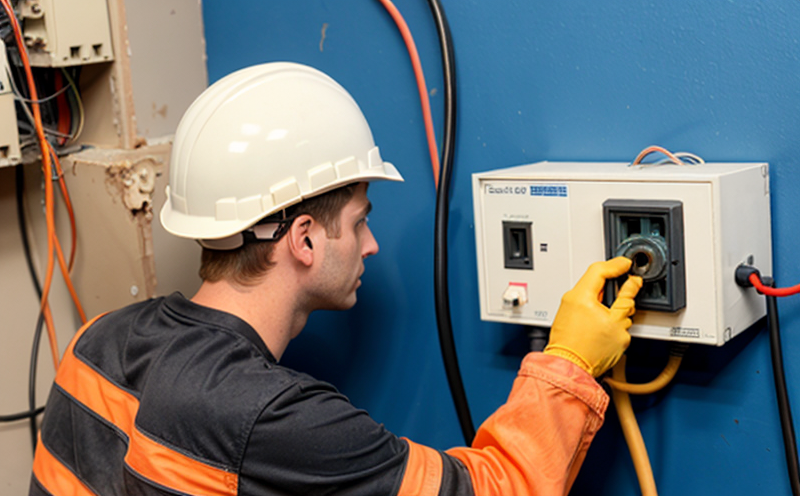IEC 60601-1 Protective Conductor Resistance Testing
The International Electrotechnical Commission (IEC) standard IEC 60601-1 sets the safety requirements for electrical medical devices. One critical aspect of this regulation is ensuring that protective conductors have a low enough resistance to prevent dangerous voltage levels from being applied to the patient or user during fault conditions.
Protective conductor resistance (PCR) testing, specifically as outlined in Clause 8.10 of IEC 60601-1:2016, is aimed at preventing electrical faults that could lead to hazardous current flow. The primary goal of this test is to ensure that any fault conditions do not result in excessive voltage drops or currents which might harm the patient.
The standard specifies that PCR should be measured using a low impedance reference electrode (LER) and a high-precision multimeter. This measurement should ideally take place before and after assembly, as well as upon initial production testing to ensure consistent quality throughout manufacturing processes.
During the test, a resistance of <0.2 Ω is generally required for protective conductors in medical devices. However, specific values may vary depending on the type of device and its intended use. For instance, Class I devices often have higher PCR limits compared to Class II or Class III devices.
The test involves connecting a known current source across the protective conductor, recording the resulting voltage drop, and calculating resistance using Ohm's law (R = V/I). It is essential that this testing be conducted in accordance with international standards such as IEC 60252-3 and ASTM F1750.
Understanding PCR measurement requires familiarity with both the device under test (DUT) and its electrical context. The correct placement of current sources, voltage probes, and reference electrodes is crucial for accurate measurements. Incorrect placements can lead to misleading results which might not reflect actual protective conductor performance during real-world faults.
The importance of PCR testing cannot be overstated, especially when considering the diverse range of medical devices available today—from simple patient monitors to complex imaging machines. Ensuring that all components comply with these stringent requirements helps protect patients and healthcare workers alike from potential electrical hazards.
Failure to meet PCR specifications can result in non-compliance issues leading to recalls or even legal action against manufacturers. Therefore, it is imperative for medical device companies to invest in robust testing protocols early in the design phase to avoid costly delays later on.
- Environmental Impact: By ensuring that protective conductors have minimal resistance, we reduce the risk of electrical faults causing fires or burns. This contributes positively towards reducing hospital-acquired infections (HAI) rates and enhancing patient safety.
- Sustainability: Adhering to stringent PCR limits helps minimize energy consumption during operation by avoiding unnecessary heat generation within protective circuits. Over time, this can lead to significant savings in terms of resource usage and operational costs for hospitals worldwide.
Why It Matters
The significance of PCR testing extends beyond mere compliance with regulatory requirements; it directly impacts patient safety and overall quality assurance. Inadequate protection can lead to severe injuries or even fatalities if a fault occurs during use. Thus, rigorous adherence to IEC 60601-1 is not just a legal requirement but also an ethical obligation towards those who rely on medical devices for critical care.
For manufacturers, consistent PCR testing ensures reliability and performance across all products. This consistency builds trust with regulatory bodies and customers alike while reducing the likelihood of product failures in market environments. Moreover, it allows companies to identify potential issues early in development stages, enabling them to make necessary adjustments before mass production begins.
From a broader perspective, maintaining high PCR standards contributes significantly towards global healthcare improvements by fostering safer working conditions for medical personnel and better treatment outcomes for patients. It underscores the importance of continuous improvement practices within organizations dedicated to producing safe and effective medical devices.
Eurolab Advantages
At Eurolab, our expertise in electrical safety testing is unparalleled. Our state-of-the-art facilities are equipped with advanced instrumentation capable of performing precise PCR measurements according to IEC 60601-1 standards.
- Accurate Results: Utilizing sophisticated equipment and experienced personnel ensures that every measurement adheres closely to industry benchmarks.
- Rapid Turnaround Times: Leveraging cutting-edge technology allows us to complete tests swiftly without compromising accuracy. This efficiency is particularly beneficial for time-sensitive projects.
- Comprehensive Reporting: Our detailed reports not only summarize findings but also provide actionable insights, helping clients address any identified discrepancies promptly.
- Regulatory Compliance: With a deep understanding of international standards like IEC 60252-3 and ASTM F1750, we ensure that all tests meet relevant requirements.
We pride ourselves on delivering reliable PCR testing services tailored to individual client needs. Whether you're looking for routine quality control checks or one-off assessments during product development phases, Eurolab can offer the support required.





